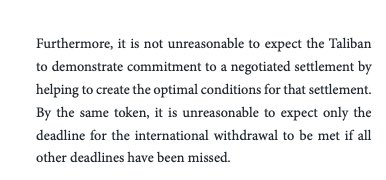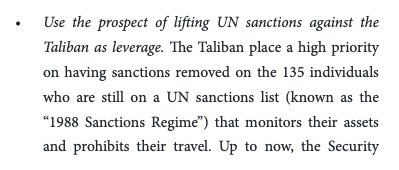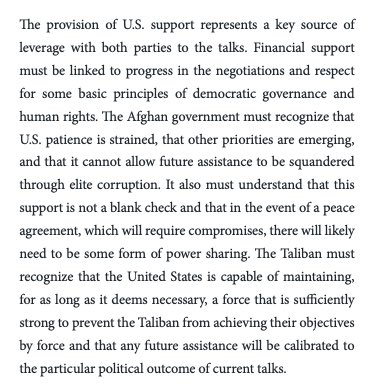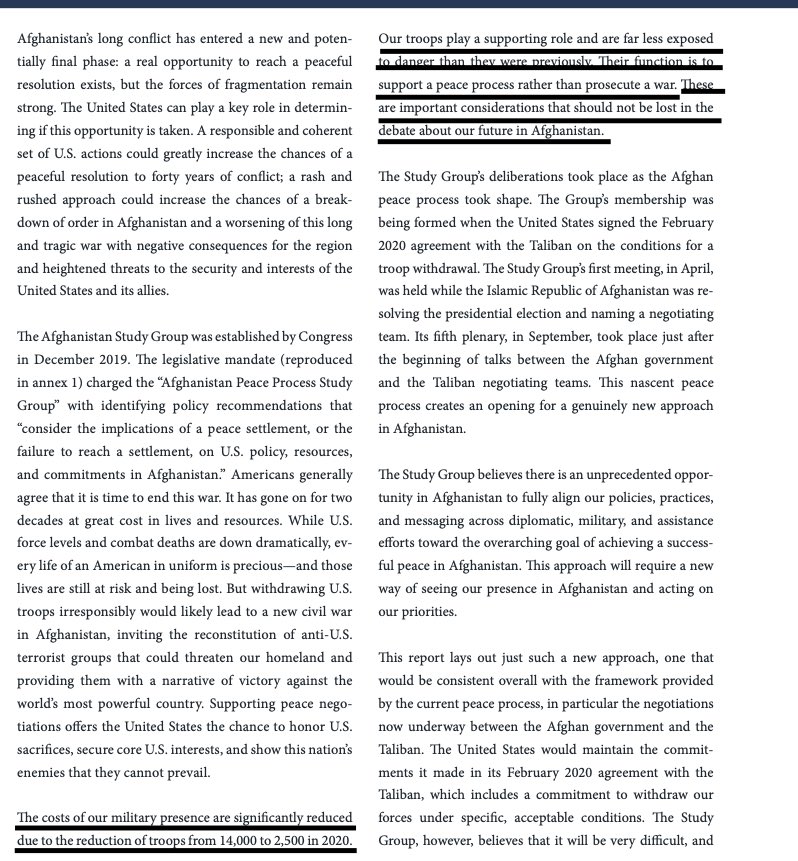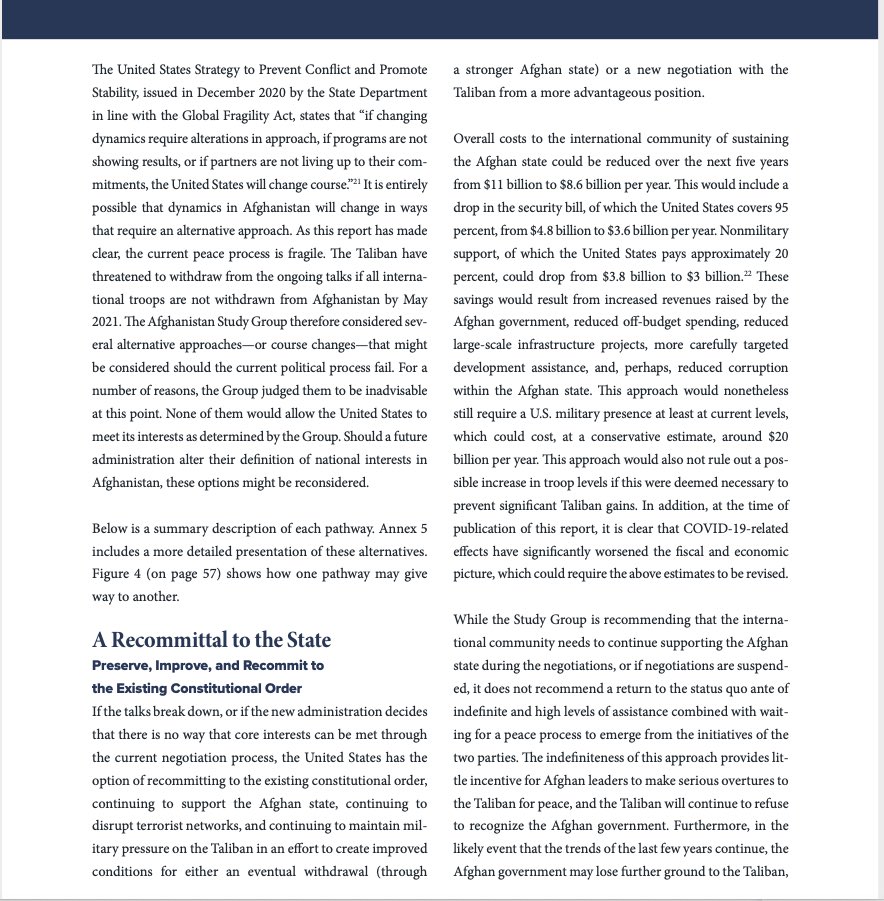A look at the report and recommendations of the Afghanistan Study Group.
THREAD
https://www.usip.org/publications/2021/02/afghanistan-study-group-final-report-pathway-peace-afghanistan
THREAD
https://www.usip.org/publications/2021/02/afghanistan-study-group-final-report-pathway-peace-afghanistan
2/n: The report offered many great insights and drew on the expertise of some of the best scholars out there.
Unfortunately, as bad news sells better on Twitter, I will mostly focus on the what the report left out or didn't draw out rather than the positive aspects.
Unfortunately, as bad news sells better on Twitter, I will mostly focus on the what the report left out or didn't draw out rather than the positive aspects.
3/n: The Report is quite comprehensive in the sense that it offers a preferred policy approach (with five recommendations in pursuit of that approach) and three alternative pathways or approaches.
What I really loved was that it also contained a Red Team recommendation!
What I really loved was that it also contained a Red Team recommendation!
4/n: The recommendations state that US should not settle for anything short of a democratic government that incorporates the principles of democracy, good governance and protection of women's rights, press freedom and minority rights.
In essence, the current Afghan constitution
In essence, the current Afghan constitution
5/n: While a worthy cause, it does not explore why the Taliban would be inclined to accept this when they refused this same since at least 2011 when the offer was first made?
Unfortunately this is not explored further.
Unfortunately this is not explored further.
6/n: The most controversial recommendation, imo, is the second one that calls for abandoning/ignoring the May withdrawal deadline and instead calls for conditioning withdrawal a reduction in violence with no 'use of terror' in rural and urban centres.
7/n: It also conditions on TB obligations vis-a-vis terror groups but does not mention what the threshold would be before we can say the TB has met this obligation.
8/n: The steps stipulated under this recommendation would not be possible under the current US-TB agreement unless both parties throw the agreement aside and renegotiate a new one.
9/n: E.G. The recommendation says that not unreasonable that withdrawal is conditioned on a reduction in violence.
Completely ignores that withdrawal by May is explicitly mentioned in agreement and RiV was, presumably, an expectation resulting from start of negotiations.
Completely ignores that withdrawal by May is explicitly mentioned in agreement and RiV was, presumably, an expectation resulting from start of negotiations.
10/n: In similar vein, its recommendations that US and UN delisting be used as 'leverage' would require completely ignoring the negotiated agreement.
11/n: This raises Q that if US does not see itself to be bound by what it agreed to, why would/should they expect the TB to honour their obligations?
Can the TB not turn around and start 'conditioning' their fulfillment of obligations on new demands as well? If so, what next?
Can the TB not turn around and start 'conditioning' their fulfillment of obligations on new demands as well? If so, what next?
12/n: To its credit, report mentions that any unilateral extension of withdrawal timeline (which is what the recommendations call for) could risk collapse of entire peace process.
Fails to mention how this risk will be managed/minimised if the recommended approach adopted.
Fails to mention how this risk will be managed/minimised if the recommended approach adopted.
13/n: The biggest challenge with a conditionality-based withdrawal, presuming the Taliban ever even agree to it, is that it disincentivises the need for compromise in negotiations.
14/n: So long as the AFG govt is assured that US will not withdraw if progress is not made in talks, they have little need to make compromises in the negotiation table.
15/n: I mean, why make costly compromises when the end result would be giving a significant share of power to your erstwhile enemies and a reduction in US financial aid to the current govt?
16/n: Unless one is extremely benevolent (or selflessly stupid), no one would want to make such compromises when weighin between continued US financial and military support versus a costly power-sharing  that reduces their power and ensures US financial aid is reduced to minimal
that reduces their power and ensures US financial aid is reduced to minimal
 that reduces their power and ensures US financial aid is reduced to minimal
that reduces their power and ensures US financial aid is reduced to minimal
17/n: While the report mentions that AFG govt should recognise US patience is strained, it does not address what incentive there would be for AFG govt to actually make compromises without which the TB are unlikely to accept a political outcome.
18/n: The report also praises the reduced costs resulting from 2,500 troops but leaves unanswered the contention that if recommendations are adopted, TB will likely walk out of talks. In such case, is the current troop levels sufficient? Reprt says no!
So why promote this point?
So why promote this point?
19/n: The report talks about an alternative pathway where the US abandons the peace process and refocusses on continued military and financial support to AFG govt. Says this is undesirable approach.
20/n: Problem is, there is a very high probability that if recommendations are adopted, the TB will walk out of talks (they only agreed to intra-AFG talks because of a time-stipulated withdrawal). Thus this pathway is exactly what would be the most likely outcome.
21/n: Overall, I found the Red Team's report to be much closer to the ground realities and cognizant of Biden's policy preference.
22/n: I will end with this one portion of the report.
I think this is the most important part of all.
The US negotiated a bad deal. I don't know if they could have gotten a better one but the Doha deal is what they agreed to.
I think this is the most important part of all.
The US negotiated a bad deal. I don't know if they could have gotten a better one but the Doha deal is what they agreed to.
23/n: While there is probably room to renegotiate this (and other international agreements), the US should avoid walking out on intl deals every four years.
24/n: Such an approach not only brings disrepute to US but gives the other sides reasonable justification to also walk away from the deal when they can afford to do so.
END
END

 Read on Twitter
Read on Twitter

